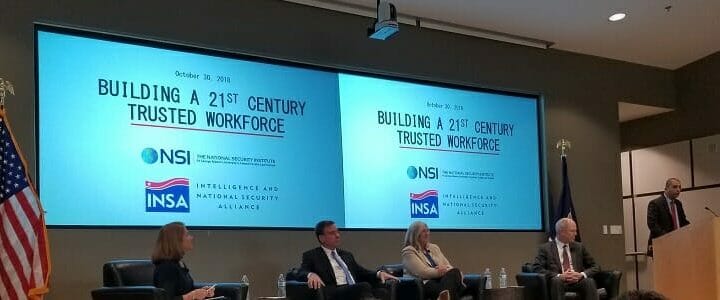As clearance holders know, individual citizens can’t just “get” a security clearance. Clearances are granted to an individual by virtue of the position they hold; a person must be hired for a job that requires it and their employer must sponsor them through the background investigation process. In order for that clearance to stay active, that person must stay in a job that requires it. In other words, security clearances are not “portable.”
Of course many employees are able to maintain their clearances while moving from one contract, position, or agency to another. Often this often involves reinvestigations, wait times, and frustrating tangles with the Scattered Castles and JPAS databases. But soon that could all change.
Congress, ODNI, and Industry want you to keep your clearance
At a panel discussion this week hosted by the Intelligence and National Security Alliance (INSA) in partnership with the National Security Institute (NSI) of George Mason University, clearance portability, reciprocity, and clearance in person took center stage. Panel speakers INSA Chairman Tish Long, Sen. Mark Warner, Principal Deputy Director of National Intelligence Sue Gordon, and CEO of ManTech Kevin Phillips all echoed the need for creating real reciprocity between agencies and attaching clearances to people – rather than positions.
Sen. Warner emphasized that clearance portability and reciprocity between agencies merely reflects the changing nature of the entire American workforce. “In many ways, particularly for our contracting community, we have to recognize that very few people – either on the governmental side or the contracting side – are gonna work in the same firm for 35 years. They’re going to move around, they’re going to move to different contracts. So even if we get that initial clearance down, unless we can do clearance reform with vigorous and real reciprocity, we’re just pushing the rock up the hill.”
Deputy Director Gordon is on the same page. “There is no one more interested in solving the issues of reciprocity than the government side. And the reason is because, especially in a time of dynamism in the terms of mission needs, the private sector is a huge provider of the talent we need and agility and nimbleness cannot be accomplished if we can’t do this. So reciprocity is huge.”
Speaking on behalf of industry, ManTech CEO Kevin Phillips suggested radical streamlining and clearance portability. “For every level of classification that exists: a single application, a single investigation, a single adjudication, so the clearance follows the person. It’s portable, it’s reciprocal, it’s automatically accepted and exceptions are rare – not normal.”
In Person Clearances and the IAA
Sen. Warner, as he has in the past, echoed the Senate Select Committee on Intelligence’s (SSCI) bipartisan support for security clearance reform, and support within the rest of the Senate, as well. This can be seen in the committee’s proposed Matthew Young Pollard Intelligence Authorization Act (IAA) for Fiscal Years 2018 and 2019. This bill proposes a number of reforms to the clearance process, including exploring the idea of clearance in person, or clearance portability. If passed, the IAA would require:
- A report on the clearance in person concept. “Not later than 90 days after the date of the enactment of this Act, the Security Executive Agent shall submit to the appropriate committees of Congress a report on the requirements, feasibility, and advisability of implementing a clearance in person concept as described in subsection (b) for maintaining access to classified information.”
- The maintenance of clearance eligibility and clearance portability. “Implementation of a clearance in person concept as described in this subsection would permit an individual who has been granted a national security clearance to maintain eligibility for access to classified information, networks, and facilities after the individual has separated from service to the Federal Government or transferred to a position that no longer requires access to classified information.”
- Recognition of clearances as current, with no need for reinvestigation. “The concept described [above] would also ensure that, unless otherwise directed by the Security Executive Agent, the individual’s security clearance would be recognized as current, regardless of employment status, with no further need for investigation or revalidation until the individual obtains a position requiring access to classified information.”
This version of the IAA has passed out of the SSCI, but awaits discussion and a vote on the Senate floor.
Those seeking security clearance reform don’t need to wait for the IAA to pass, however – the same language is included in the 2019 National Defense Authorization Act, which was signed by the president on August 13. The IAA seeks to push the portability concept even further, but it’s clear the ‘in person’ concept is one the ODNI will be forced to consider.
Continuous evaluation and Clearance Portability
The issues of portability and continuous evaluation are linked because, in theory, continuous evaluation would eliminate the need for periodic reinvestigations. This would allow investigative resources to be used exclusively for new clearances, not reinvestigations. This technology, Gordon believes, will help bridge the gap between the risks that in person clearances would assume. Though currently continuous evaluation is in play, it is not yet implemented widely enough to replace reinvestigations.
“Right now we have seven data streams – credit, law enforcement – that the ODNI has made available and 20 agencies have signed up to be a part of continuous evaluation. And 15 more are working on MOU’s [Memorandum of Understanding] to do it, so it is, in fact, in play right now…But reciprocity [is the] real deal. There is a gap between the people who have to assume the risk and the tools they need in order to be confident of that risk – and that’s what we’re trying to close.”




